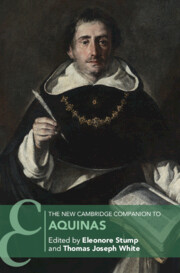Book contents
- The New Cambridge Companion to Aquinas
- Other Volumes in the Series of Cambridge Companions
- The New Cambridge Companion to Aquinas
- Copyright page
- For our teachers
- Contents
- Contributors
- Abbreviations
- A Select List of Aquinas’s Works
- Introduction
- Part I Life and Works
- Part II Metaphysics and the Ultimate Foundation of Reality
- Part III Epistemology
- Part IV Ethics
- Part V Philosophical Theology
- 13 Original Sin
- 14 The Incarnation
- 15 Evil, Sin, and Redemption
- 16 Resurrection and Eschatology
- Bibliography
- Index
- Other Volumes in the Series of Cambridge Companions (continued from page ii)
15 - Evil, Sin, and Redemption
from Part V - Philosophical Theology
Published online by Cambridge University Press: 30 July 2022
- The New Cambridge Companion to Aquinas
- Other Volumes in the Series of Cambridge Companions
- The New Cambridge Companion to Aquinas
- Copyright page
- For our teachers
- Contents
- Contributors
- Abbreviations
- A Select List of Aquinas’s Works
- Introduction
- Part I Life and Works
- Part II Metaphysics and the Ultimate Foundation of Reality
- Part III Epistemology
- Part IV Ethics
- Part V Philosophical Theology
- 13 Original Sin
- 14 The Incarnation
- 15 Evil, Sin, and Redemption
- 16 Resurrection and Eschatology
- Bibliography
- Index
- Other Volumes in the Series of Cambridge Companions (continued from page ii)
Summary
We recognize one of a pair of opposites by means of the other, Aquinas says. Just as we understand what darkness is only by reference to the notion of light, we must understand what evil is by reference to the notion of good. What is good is what is desirable. Every nature desires its own being and perfection, so we can conclude that “the being and perfection of every nature has the character of goodness.”1 Evil, then, cannot be a being or nature; it must be an absence of good. Not every absence of good counts as evil, however. A stone lacks the power to see, but its “blindness” is not evil: The nature of a stone has no aptitude for sight, and so it is no part of the perfection of a stone that it should see. Thus, evil is not a simple negation of good, but a privation of good; and we recognize a privation by comparing it with the fullness of being that is characteristic of a thing’s nature.2 Evil is a defectus: a falling short of, or falling away from, what is good.
- Type
- Chapter
- Information
- The New Cambridge Companion to Aquinas , pp. 343 - 360Publisher: Cambridge University PressPrint publication year: 2022



